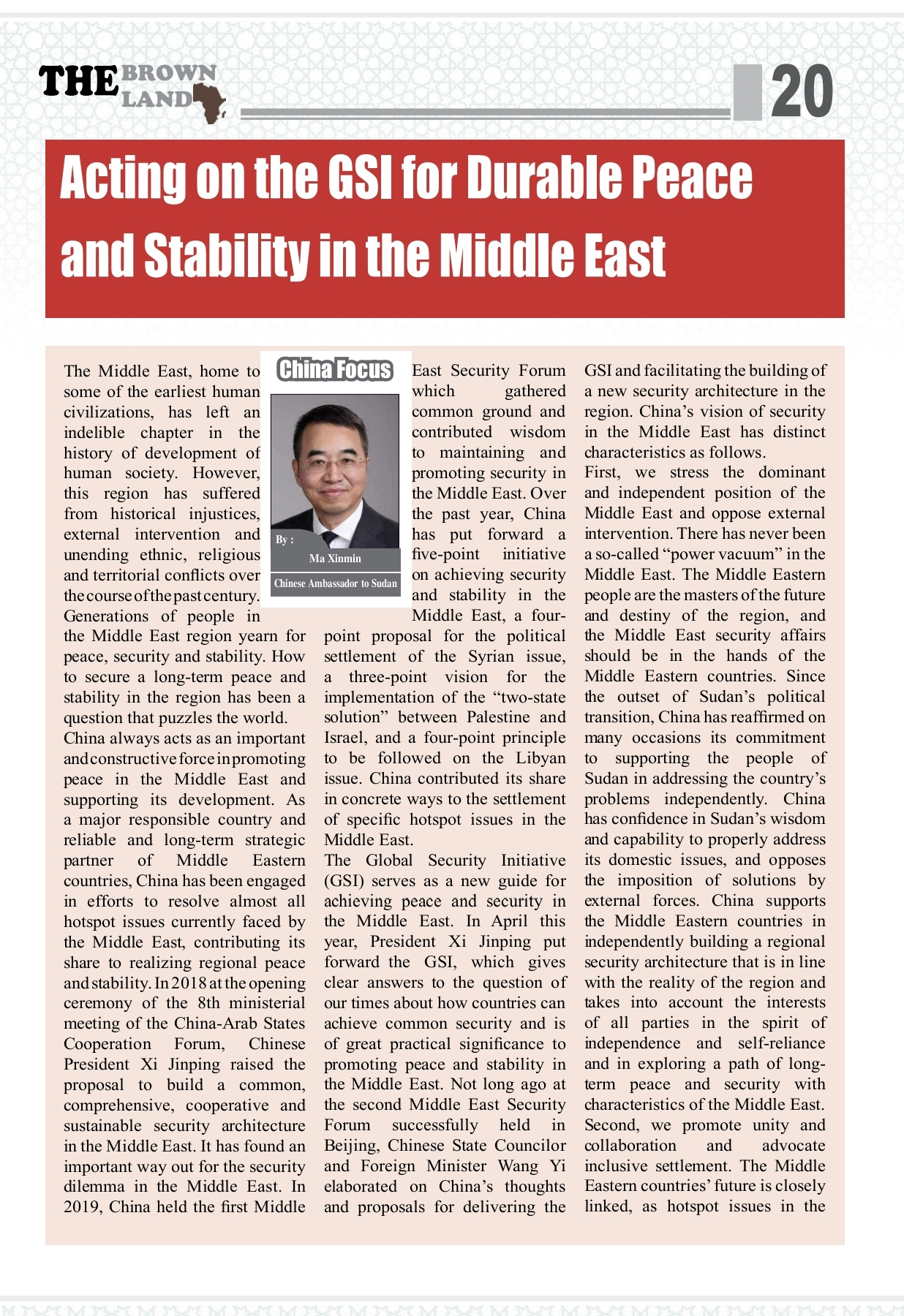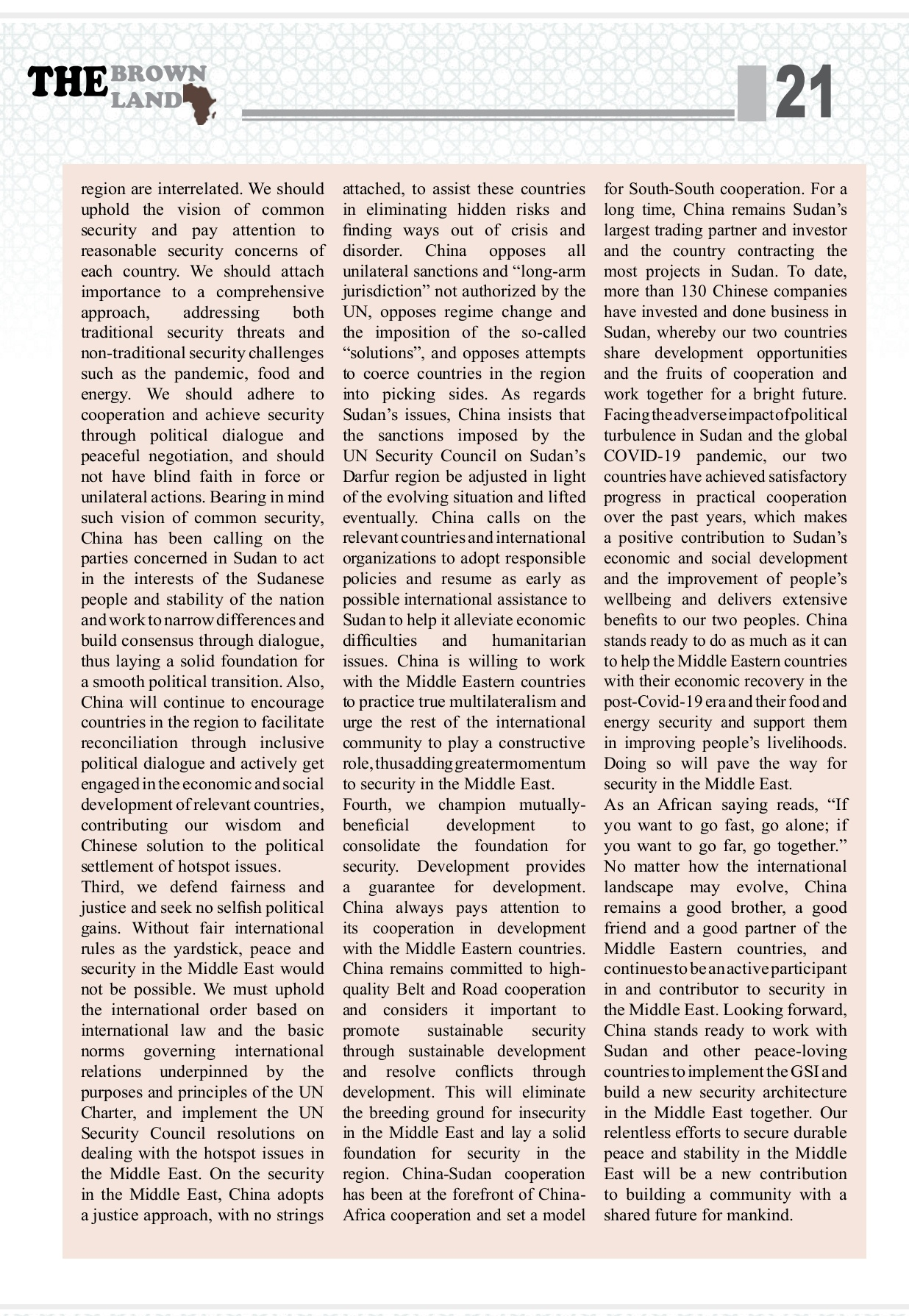On October 18, Chinese Ambassador to Sudan Ma Xinmin publishes an signature article titled Acting on the GSI for Durable Peace and Stability in the Middle East for the China Focus Column on Brown Land. The full text is as follows:

The Middle East, home to some of the earliest human civilizations, has left an indelible chapter in the history of development of human society. However, this region has suffered from historical injustices, external intervention and unending ethnic, religious and territorial conflicts over the course of the past century. Generations of people in the Middle East region yearn for peace, security and stability. How to secure a long-term peace and stability in the region has been a question that puzzles the world.

China always acts as an important and constructive force in promoting peace in the Middle East and supporting its development. As a major responsible country and reliable and long-term strategic partner of Middle Eastern countries, China has been engaged in efforts to resolve almost all hotspot issues currently faced by the Middle East, contributing its share to realizing regional peace and stability. In 2018 at the opening ceremony of the 8th ministerial meeting of the China-Arab States Cooperation Forum, Chinese President Xi Jinping raised the proposal to build a common, comprehensive, cooperative and sustainable security architecture in the Middle East. It has found an important way out for the security dilemma in the Middle East. In 2019, China held the first Middle East Security Forum which gathered common ground and contributed wisdom to maintaining and promoting security in the Middle East. Over the past year, China has put forward a five-point initiative on achieving security and stability in the Middle East, a four-point proposal for the political settlement of the Syrian issue, a three-point vision for the implementation of the “two-state solution” between Palestine and Israel, and a four-point principle to be followed on the Libyan issue. China contributed its share in concrete ways to the settlement of specific hotspot issues in the Middle East.
The Global Security Initiative (GSI) serves as a new guide for achieving peace and security in the Middle East. In April this year, President Xi Jinping put forward the GSI, which gives clear answers to the question of our times about how countries can achieve common security and is of great practical significance to promoting peace and stability in the Middle East. Not long ago at the second Middle East Security Forum successfully held in Beijing, Chinese State Councilor and Foreign Minister Wang Yi elaborated on China’s thoughts and proposals for delivering the GSI and facilitating the building of a new security architecture in the region. China’s vision of security in the Middle East has distinct characteristics as follows.
First, we stress the dominant and independent position of the Middle East and oppose external intervention. There has never been a so-called “power vacuum” in the Middle East. The Middle Eastern people are the masters of the future and destiny of the region, and the Middle East security affairs should be in the hands of the Middle Eastern countries. Since the outset of Sudan’s political transition, China has reaffirmed on many occasions its commitment to supporting the people of Sudan in addressing the country’s problems independently. China has confidence in Sudan’s wisdom and capability to properly address its domestic issues, and opposes the imposition of solutions by external forces. China supports the Middle Eastern countries in independently building a regional security architecture that is in line with the reality of the region and takes into account the interests of all parties in the spirit of independence and self-reliance and in exploring a path of long-term peace and security with characteristics of the Middle East.
Second, we promote unity and collaboration and advocate inclusive settlement. The Middle Eastern countries’ future is closely linked, as hotspot issues in the region are interrelated. We should uphold the vision of common security and pay attention to reasonable security concerns of each country. We should attach importance to a comprehensive approach, addressing both traditional security threats and non-traditional security challenges such as the pandemic, food and energy. We should adhere to cooperation and achieve security through political dialogue and peaceful negotiation, and should not have blind faith in force or unilateral actions. Bearing in mind such vision of common security, China has been calling on the parties concerned in Sudan to act in the interests of the Sudanese people and stability of the nation and work to narrow differences and build consensus through dialogue, thus laying a solid foundation for a smooth political transition. Also, China will continue to encourage countries in the region to facilitate reconciliation through inclusive political dialogue and actively get engaged in the economic and social development of relevant countries, contributing our wisdom and Chinese solution to the political settlement of hotspot issues.
Third, we defend fairness and justice and seek no selfish political gains. Without fair international rules as the yardstick, peace and security in the Middle East would not be possible. We must uphold the international order based on international law and the basic norms governing international relations underpinned by the purposes and principles of the UN Charter, and implement the UN Security Council resolutions on dealing with the hotspot issues in the Middle East. On the security in the Middle East, China adopts a justice approach, with no strings attached, to assist these countries in eliminating hidden risks and finding ways out of crisis and disorder. China opposes all unilateral sanctions and “long-arm jurisdiction” not authorized by the UN, opposes regime change and the imposition of the so-called “solutions”, and opposes attempts to coerce countries in the region into picking sides. As regards Sudan’s issues, China insists that the sanctions imposed by the UN Security Council on Sudan’s Darfur region be adjusted in light of the evolving situation and lifted eventually. China calls on the relevant countries and international organizations to adopt responsible policies and resume as early as possible international assistance to Sudan to help it alleviate economic difficulties and humanitarian issues. China is willing to work with the Middle Eastern countries to practice true multilateralism and urge the rest of the international community to play a constructive role, thus adding greater momentum to security in the Middle East.
Fourth, we champion mutually-beneficial development to consolidate the foundation for security. Development provides a guarantee for development. China always pays attention to its cooperation in development with the Middle Eastern countries. China remains committed to high-quality Belt and Road cooperation and considers it important to promote sustainable security through sustainable development and resolve conflicts through development. This will eliminate the breeding ground for insecurity in the Middle East and lay a solid foundation for security in the region. China-Sudan cooperation has been at the forefront of China-Africa cooperation and set a model for South-South cooperation. For a long time, China remains Sudan’s largest trading partner and investor and the country contracting the most projects in Sudan. To date, more than 130 Chinese companies have invested and done business in Sudan, whereby our two countries share development opportunities and the fruits of cooperation and work together for a bright future. Facing the adverse impact of political turbulence in Sudan and the global COVID-19 pandemic, our two countries have achieved satisfactory progress in practical cooperation over the past years, which makes a positive contribution to Sudan’s economic and social development and the improvement of people’s wellbeing and delivers extensive benefits to our two peoples. China stands ready to do as much as it can to help the Middle Eastern countries with their economic recovery in the post-Covid-19 era and their food and energy security and support them in improving people’s livelihoods. Doing so will pave the way for security in the Middle East.
As an African saying reads, “If you want to go fast, go alone; if you want to go far, go together.” No matter how the international landscape may evolve, China remains a good brother, a good friend and a good partner of the Middle Eastern countries, and continues to be an active participant in and contributor to security in the Middle East. Looking forward, China stands ready to work with Sudan and other peace-loving countries to implement the GSI and build a new security architecture in the Middle East together. Our relentless efforts to secure durable peace and stability in the Middle East will be a new contribution to building a community with a shared future for mankind.
